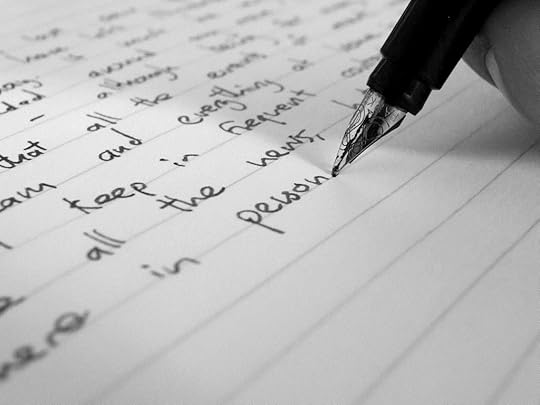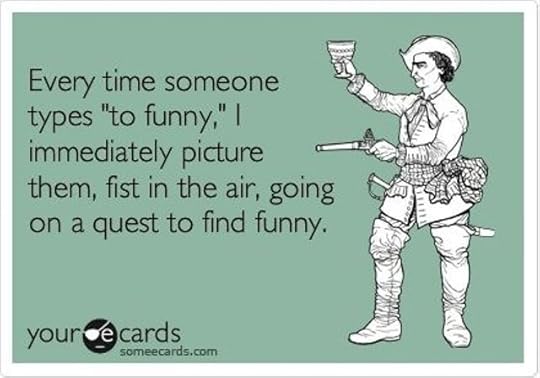Andy Peloquin's Blog, page 59
August 6, 2014
When Do You Do Your Best Work?
“You never have to change anything you got up in the middle of the night to write.” ― Saul Bellow
Have you ever found yourself drifting off to sleep late at night and suddenly an idea strikes you right in the creative part of your brain? You wake up and cannot go back to sleep until you jot this idea down. By the time you’re done, it’s an hour later and you’ve basically written an entire novel!
It’s amazing how this happens to so many writers. I’ve heard lots of my writing friends say, “I hate how it doesn’t let me sleep, but it’s so awesome that it just flows out of me.”
This happens to me all the time, particularly when I’m in the middle of a WIP that I’m concerned about. If I have a passage that is troubling me or which is particularly difficult, my brain will kind of worry away at it until it figures out how to do it right. Unfortunately, that’s usually right when I’m in that sweet spot between drowsiness and actual sleep.
When the idea hits, it’s impossible to just ignore it and go back to sleep. My brain starts to worry at the thread of the idea, slowly unraveling it and basically following the story concept. It creates more and more of the story until I’ve basically got an unwritten novel in my head, and I am forced to get up and write it down.
Nearly a decade ago, I was falling asleep on a dark, stormy Thursday night, somewhere around November the 2nd–Halloween. Suddenly my brain struck with a wicked idea of a dark, gruesome ritual that would be carried out on the night when the fabric between the worlds of the living and dead would be weakened.
Goodbye sleepy time! I was forced to get up and write down the idea, and before I knew it, it was 3 AM and I had a fully-written piece of prose. The entire time I was writing it, I kept getting shivers down my spine, and the shivers are still there every time I read over it.
The night is definitely a time for creativity, which is why I no longer try to stifle the ideas when they come as I’m drifting off to sleep. The love of my life can attest to the number of nights that I’ve gotten up and taken my iPad or laptop to the bathroom to write down my ideas without waking her up. It’s been far too many sleepless nights just because some inspiration sticks in my head until I manage to winkle it out onto a piece of paper.
That’s how The Last Bucelarii came about, as well as a number of the other works you can expect to see over the course of the next decade or so. It’s just the way my mind works, and it’s a truly wonderful experience–which always leaves me exhausted the next day, of course!
August 4, 2014
Writing Mistakes: Insufficient Description
This is a mistake that I made a lot when writing In the Days: A Tale of the Forgotten Continent for the first time, and it’s one that I hope never to make again.
Have you ever noticed how some books suck you into the rich, detailed world, feeding you images of everything around the character as he/she moves? You get all the sights, sounds, and smells, and the book is a much more complete experience because of it!
And then there are writers who fail to give you all of the details of what’s going on around the characters. You get a small glimpse of the city/terrain in which they find themselves, but there is little detail added as scenes change. It forces readers to use their imagination to fill in the details, and the book is just a little poorer because of the lack of imagery.
As a writer, your job is to help people see the world that you have constructed in your head. You want them to be transported to this world with you–whether that world is Middle Earth, your own fictional continent/planet, or downtown New York City. You have to feed them details of what the world is like in order to give them an idea what they should be picturing in their head.
Here’s an example of what I consider to be sufficient description:
Business was booming at The Iron Arms tonight, though every night found the tavern full to bursting. Thanks to its proximity to the docks, the alehouse saw a steady stream of day laborers, roughnecks, and roustabouts hoping to quench their thirst at the end of a long day.
Drunken tradesmen and merchants filled the tables, while tired dockhands nursed tankards overflowing with frothy ale. The smell of sawdust and stale sweat hung heavy in the air, and peanut shells mixed in with the wood shavings on the floor. The sounds of clinking glasses, shouting patrons, and loud conversations filled the air.
Barmaids wended their way through the bar patrons, delivering drinks with a hearty laugh and a hard slap to roving hands. Their bodices looked too tight, but the men filling the bar approved of the scanty outfits. Indeed, the wenches found themselves fending off advances from all sides, though occasionally one would hustle up the creaking stairs with a customer for extra special customer attention.
(excerpt from The Last Bucelarii, Book 1: Blade of the Destroyer)
It gives you an idea of what the place looks, smells, and sounds like, and it helps to set the tone for the ambience (the presence of roughnecks, the loudness of the bar, the customers leering at the wenches, etc.).
Writers, fill in the details! Don’t leave us readers hanging in a colorless, odorless, soundless void where our imagination is forced to fill in the details, but feed those details to us. It makes for a much better read!
July 30, 2014
What is a Writer’s Best Asset?
I’ve always thought that a creative mind and writing talent were the two most important things for a writer, but it turns out I was wrong.
According to one smart woman:
“I would advise anyone who aspires to a writing career that before developing his talent he would be wise to develop a thick hide.” —Harper Lee
Turns out the woman who wrote To Kill a Mockingbird had a bit of flak coming her way. While it won a Pulitzer Prize and has become a classic that everyone must read, upon publication reactions weren’t so hot. For example, Granville Hicks said the book was, “melodramatic and contrived”. Even the greatest books have their own detractors.
As a writer, you’re going to find people just don’t like something about your book. Whether it’s the story line, the dialogue, the plot twist that you thought was so original, or the character development, there will always be people telling you that your book sucks.
When I published In the Days, I thought I had done a good job with it. I got a few good reviews, and I was happy with the way things went. And then I got my first 3-star review:
“For one thing, it was too difficult to work out who were the good guys and who were the baddies. So I was left with not liking anyone which isn’t a good way for me to read a book. This book took more effort than I was willing to give it. A real shame as the author shows real talent.”
That was a bit hard for me to hear, because I thought I had done a pretty good job of writing the book clearly. This is just one of the three 3-star reviews I’ve gotten, plus a few more negative comments on sites like Goodreads. None of them are HORRIBLE, but they can be a bit discouraging for an author.
And then I read the Harper Lee quote on having a thick skin, and I realized that I had been given an opportunity to take these criticisms and use them for good. As I’m sitting and writing Book 2 of The Last Bucelarii series, I’m taking into account all of the negative feedback I got. I’m trying to avoid making the same mistakes, thereby hopefully improving my books.
As an author, you MUST have thick skin. Negative feedback and even outright criticism is just a part of your life as a writer, and you’ll need to deal with it in order to be successful. Use that criticism for good, and learn to love it! It will make you a better writer in the end.
July 28, 2014
Writing Mistakes: Wordiness
Writers, keep this one piece of advice in mind:
“Never say in 10 words what you can say with 3.”
One mistake I find myself making A LOT is being too wordy. I like to think that adding an extra word or two helps to add something to the sentence, something like gravitas, weight, an extra punch.
See what I did there? I made that sentence far longer than it needed to be to prove a point.
To be a good writer, it’s time to cut your writing way back! You need to start looking for concise ways to get your point across, as that will make your work much, much better.
Think about this line:
“It was the best of times, it was the worst of times.”
Short, pithy, and properly Dickensian. In that line, it basically sets the tone for the entire book. It tells you everything you need to know about the setup for the story, and it’s just 12 words!
According to some experts, as many as 50% of writers make this mistake. Some writers could stand to lose a few thousand words, while others would do well to trim it down by ten, twenty, or even thirty-thousand words. Talk about editing with a brutal pen!
When you write, try to say as much as you can in as few words as possible. Keep your paragraphs short, your dialogue snappy, and your descriptions on track. Don’t meander and give your readers too many details, but just give them enough to keep them hooked.
Once the writing is done, go back over it and start looking for words to cut out. If they’re extraneous, cut them. If you can say with one word what you currently say with three, cut them. If they don’t add to the book in some way, cut them.
Stephen King likes to trim his books down by at least 10% in the second draft. That’s a serious reduction in word count, but it works to make his prose so much better.
Remember: sloppy, wordy prose can sometimes come across as sloppy thinking. Trim down your writing, and your readers will thank you for it!
July 14, 2014
Writing Mistakes: Not Reading Enough
This is something you’ll hear EVERYWHERE, so I apologize if it sounds a bit clichéd. I think I’ve even posted on the importance of reading more, but it’s so fundamental to your skills as a writer that I’m going to repeat it in this issue of Writing Mistakes.
One of the silliest mistakes you can make as a writer–content copywriter, a novel writer, comic book writer, or marketing writer–is not reading enough. Why is this?
You’re no doubt good at something right now, but how did you get those skills? It doesn’t matter whether you’re a skilled skateboarder, a video game champion, or a top-level advertising executive, you had to learn from something and someone. You studied, watched videos, and exposed yourself to as much material as possible in order to expand your skills.
The same is true with writing!

When you write, you have your own style, the way you write RIGHT NOW. You may think that your current writing style works, and so you live in your own little bubble of how you believe things should be done.
However, when you limit yourself to your own skills and expertise, you stagnate. You end up regurgitating the same swill over and over, never really learning or trying anything new.
And then you crack open a book, and a whole new world is opened up to you. You not only read a new story with new twists and plots, but you experience a new writing style. You encounter things that you like and want to emulate, as well as things you hate and want to avoid. By the end of that book, your writing style has changed slightly–hopefully for the better!
Basically, you need to read more in order to see how good writers write. Your style may be good, but why not make it great or AWESOME? To really improve your skills as a writer, you need to start expanding your knowledge base and reading more.
Are you a novelist? Pick up novels not just within your genre, but in other genres you’d never write about as well. Are you a copywriter? Look at copy written by the top experts in your field and see how they write engaging content. Are you a graphic novelist? Read more comics to see how the big dogs (Marvel, DC, BOOM, etc.) do it.
The more you read, the more versatile you become as a writer. It’s just that simple!
July 11, 2014
How to Define Your Writing Style
I find myself listening to audiobooks and reading novels and realizing, “I like the way this author writes. I want to write like him.” I make mental notes of the writing style, the way he/she strings sentences together, and plan to imitate that writing style when I next sit down.
And then I actually sit to write, and all of my plans go flying right out of the door! Instead of coming out in the writing style I wanted to imitate, it comes out the way I normally write.
That’s kind of the way a writing style works. A wise man once said:
“Style is to forget all styles.” —Jules Renard
Truth be told, your writing style will NEVER be the same as someone else’s. You can try to model your writing after the great writers that you read regularly, but you’ll never get it quite right. The way you think, the way you speak, what you read, your emotions, and millions of other factors influence your writing style. There is no way that all of those factors will be the same as the writers you want to emulate, so your style will always be a bit different.
Now I’m not saying that you shouldn’t try to copy what you like in other writers’ styles. When I was writing In the Days, I was reading Glen Cook’s latest Garrett P.I. novel. It’s a snarky, sarcastic book, and you can see that same sarcastic tone in the way I was writing.
When I started writing my latest novel, The Last Bucelarii, I was smack in the middle of Brandon Sanderson’s The Way of Kings. The descriptions are much more complete, and the writing is much more somber. When you read the book (hopefully in the next few months), you’ll see that the writing style has shifted in that direction.
To be a good writer, you SHOULD try to emulate the writers you look up to. I know that I’ve been referring to writers like Brandon Sanderson, Michael Sullivan, and Scott Lynch for descriptions, characters, and dialogue. It helps me to “up my game” so that my writing comes out at a level hopefully somewhere in the vicinity of theirs.
But, can I try to fit my writing style into their box? Absolutely not! I have my own unique writing style, and no amount of reading will ever change that.
You need to find your own unique voice, and make it stand out. Learn from the best, but improve on their work if you can. Let your reading help you to improve your writing, but find your own voice in your writing. There is already a Brandon Sanderson, a George R.R. Martin, and a J.K. Rowling in the world, and we don’t need another. You are the only version of “you” that we’ve got, so let your writing give us that taste of who “you” are!
July 9, 2014
Random Thoughts
Do you ever find yourself without anything to say? It’s happening to me right now. I’m sitting in front of this blank Word document, and I have no idea what to say in this blog post.
I could tell you about how my latest novel is going, but it’s only so interesting to hear, “I’m finishing Chapter 14 of 15, and then I have to go back and re-edit and do a second draft and blah, blah, blah…”
It makes me think that writers by nature tend to be fairly self-centered people. After all, we post updates on our progress, hoping that someone(s) will say, “Hooray! I’m looking forward to reading the latest brain-cloud that you are now turning into something you’re trying to sell.” It’s like we’re putting ourselves out there in search of validation from an external source, when really we are kind of insecure little boys and girls on the inside.
I wonder what that says about readers as well. Why would someone read a story that comes from someone else’s mind? Are we so desperate to distract ourselves from the s*** in our own lives that we have to gobble down someone else’s c*** as a temporary relief? Seems pretty much the case, but I guess that’s what makes a story so interesting.
A story does exactly that: it pulls you out of your own life and puts you in the life of someone else who is having to deal with their own crises. You get this god-like view of someone else’s suffering and trials, and the whole time you read a book you’re almost rooting for things to go from bad to worse just so that the story gets better. After all, it’s only the insurmountable odds and huge challenges that make for a great story. No one ever reads the story of “The Day I Went Shopping at Wal-Mart and Came Home With All the Groceries I Needed”.
I apologize for the random post, but that’s what was on my mind at the time. I promise that the next one will be much more coherent and organized. Cheers!
July 7, 2014
Writing Mistakes: Following the Rules Too Closely
In my last Writing Mistakes post, I talked about the importance of following the rules of grammar and punctuation in order to make your writing good. This week, I’m going to advise you to break a few of the rules.
Everyone knows that you have to follow the rules of grammar and punctuation in order to write well, but sometimes following the rules too closely leaves you with dry, boring writing.
If everyone followed the same style of writing, every book would be samey. There would never be anything original, as everyone would follow the same general structure and formula for writing.
A good writer follows the advice below:
“Learn the rules of good writing… then learn when and how to break them.”
Essentially, you need to know how to do things right first, and then you can fiddle around a bit.
For example, if you read the Prince of Thorns series by Mark Lawrence, you’ll find that he uses fragments A LOT. On the other hand, flip through any Dave Barry book, and you’ll come across sentences that occupy entire paragraphs. These sentences aren’t technically grammatically correct, but they set these writers’ writing styles apart from the others.

When writing, try to find your own unique voice. Don’t copy the grammar and style of other writers, no matter how awesome those writers are. Use their writing style to help you find your voice, or to discover, “Hey, I like it when this writer breaks that rule of grammar. Let’s see if I can do the same.”
Break just one small rule, but try to break it consistently. Make the rest of your writing 100% grammatically correct, but let that one broken rule set your writing style apart from everyone else.
IMPORTANT: THIS IS WHERE BETA READERS COME IN HANDY. They’ll read over your writing and give you feedback on how that “one broken rule” sounds. If they like it, you’ve found your writing style. If it throws them off or doesn’t work for them, try again!
July 2, 2014
Finish What You Started!
“The road to hell is paved with works-in-progress.” —Philip Roth
How many of us have something that is still “in progress” but is going nowhere? There’s that novel we started all those long years ago, but which we can never seem to find the time for. There may be a short story we’ve been planning to pen, but it’s never gotten past the stage of “story concept”.
I’ve had some of my writing friends tell me, “I’m in the middle of three or four different WIPs (works-in-progress), and I can’t dedicate enough time to any of them!”
Of course you can’t find enough time! A work-in-progress is very similar to a child. It’s something you love dearly, you want to spend as much time on it as possible, and it consumes every spare thought. Basically, it demands as much time as a child does.
So, if you’re spending all of your time on one “child”, how could you have any MORE time to spare for a second, third, or fourth?
What is it that stops us from finishing what we’ve started? I’m currently in the middle of only two projects: the one that is occupying all of my time, and the one that I’m putting off writing. Do you know why I’m putting off writing that second one? It’s because I’m scared!
That’s right: I’m terrified of making progress on that second WIP because I’m afraid that it’s not going to be as good as it could be. It started out with an idea so genius and brilliant that the first “chapter” came ripping out of me. I had to stop driving, pull over to the side of the road, and take the time to write things down before I lost that creative genius. The chapter basically wrote itself, all I had to do was type.
But now, the creative flow is no longer there. I’m worried that when I pick up that pen again, it’s just not going to come out as good as the first chapter did. The quality is going to slip, the story is going to suck, and it’s going to flop.
I’m going to face my fears in a few weeks when I finish my current WIP, and I’m going to pick up that pen on that second WIP and hammer out some more. I’m going to swallow that anxiety that my book isn’t going to be as good as it could be, and I’m going to ignore that nagging side of my mind that tells me “Oh, this sucks!”
Fear may be what’s holding me back from making progress on this WIP, but what’s holding you back? Why wouldn’t you finish one thing before moving on to the next? My friends and fellow writers, finish what you’ve started!
June 30, 2014
Writing Mistakes: Not Following Grammar Rules
When you write, you know you’re supposed to follow the rules of grammar. It’s what makes writing good, right?
Few writers are going to put a paragraph like this in their books:
“John watched Mary walk away, crying as she went because she was so so sad because he hurt her when he killed her pet dog in a drive by banana crushing accident. When she reached the end of the drive-way, she turned around and shook her fist at him. I’ll get you yet, you cold-hearted bastard son of an egg-sucking yarmulke, she cursed.”
Horribly structured sentences, riddled with grammar and punctuation mistakes, not to mention just poorly written garbage.
When you write, you stick to the rules of grammar because they’re what make your book readable. However, every writer wants their writing to be unique, so we’re tempted to break out of the mold just a bit.
Some writers use fragments, others use long-winded paragraphs (here’s looking at you Dave Barry), and still others structure their sentences in unique ways that are grammatically correct, but only barely.
There are some writers that can get away with it, and they do so VERY well. They break the grammar rules, but they do so with such aplomb that we hardly notice it. We’re so caught up in their stories and their characters that the flouting of the rules goes by unnoticed.
And then there are the newbie writers like you and me who try to sneak these things into our books, and we fall on our faces. Our writing skills just aren’t where they should be to break the rules just yet, so we end up making our books weaker and less enjoyable as a result.
For your own sake, at least for now, stick with the rules of grammar and good creative writing. Until you can find your own way to break those rules the RIGHT way, follow them closely. Sure, bend them a bit, but make sure that your writing is grammatically correct and readable.
Helpful hint: Use THIS TOOL to see how readable your writing is.
Just to make things interesting, here’s the topic of next week’s Writing Mistakes post: Following the Rules Too Closely.











